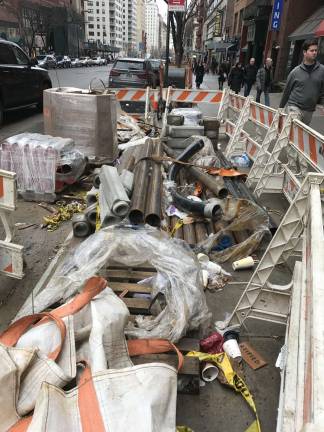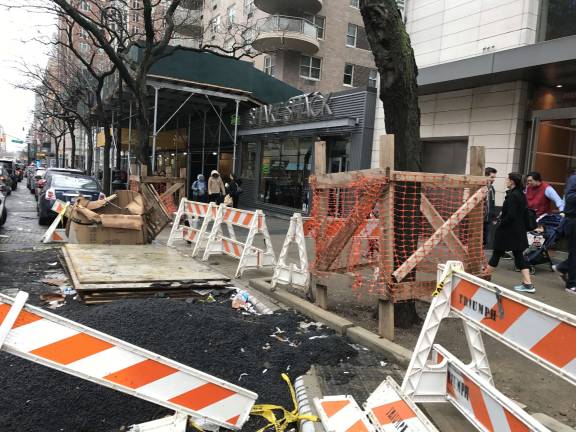a bid blooms on 86th street



BY DOUGLAS FEIDEN
It was 1988 when a group of Upper East Side merchants and property owners seeking to combat crime and grime first proposed the Yorkville-East 86th Street Business Improvement District.
Peddlers, pushers and panhandlers haunted the then-seedy commercial corridor, and the prospect of asking businesses to pay an extra levy to fund safer, cleaner streets seemed like a slam-dunk.
Guess again. Three major commercial property owners balked at the assessment. Some residential owners objected, too. And for the next 13 years, the founders of the would-be BID struggled to gain traction.
They rewrote its mission, changed its scope, mapped and remapped its boundaries, added to its budget, subtracted from its budget – even dropped the word “Yorkville” from its name. Nothing worked.
Faced with insurmountable opposition, the steering company formed to create the BID finally threw in the towel and withdrew its application from the city’s Department of Small Business Services in May 2001.
Now, 30 years after the launch of that initial effort and 17 years after its collapse, a campaign to organize a new BID anchored by East 86th Street has reached critical mass, according to people close to the process.
If multiple city approvals are secured, the proposed BID — in a 20-block, rectangular-shaped area bounded by First Avenue and Park Avenue and East 84th and 88th Streets — could become a reality later this year.
Designed to lift the area’s quality of life, the BID would be a nonprofit public-private partnership providing sanitation, street maintenance, public safety, vendor enforcement and homeless outreach. It would supplement, not replace, city services, drawing on funding from a special property assessment akin to an additional tax.
The BID’s initial annual budget would be $900,000, according to the proposal from its steering committee, which includes seven property owners, three civic groups, local elected officials, small business owners and the nonprofit Doe Fund.
Still uncertain is the organization’s name. One logical choice is the East 86th Street Business Improvement District.
Another option: “BID East Eighties,” or BEE, which is favored by City Council Member Ben Kallos, who represents the area and has been spearheading the effort and winning over wavering property owners for the past 2.5 years.
“This will finally provide the funding the community has needed for generations to support our businesses and keep 86th Street clean and tidy and beautiful,” Kallos said.
“Even with millions of dollars in city investment in the area, folks still feel that 86th Street needs more attention, and that’s where the BID comes in,” he added. “This will go above and beyond what government could possibly do.”
The breakthrough came earlier this month when a tally found that the owners of at least 50.1 percent of the value of commercial assessed properties in the district were backing the BID, Our Town has learned.
That is the threshold required for the proposal to advance — the failure to reach it doomed the original 1988 initiative and at least one other abortive effort — and it means that property owners have agreed to pay the annual levy to fund services and make the BID viable.
The good news was unveiled on Tuesday, January 23rd at Maz Mezcal, the Mexican restaurant at 316 East 86th Street where owner Mary Silva, a steering company member, has hosted several meetings for BID organizers and business owners, participants said.
“We have achieved the support of the majority of commercial assessed value in the neighborhood,” Kallos confirmed in an interview. “It is a very big deal.”
Indeed, expectations among merchants are great: “Some 40 years ago, there were dance halls on East 86th Street, and some very, very good restaurants,” Silva said. “It was the place to come for an evening’s entertainment.”
Back then, the street was known variously as “Sauerkraut Boulevard,” the “German Broadway” or the “Teutonic Corridor,” and Silva ticks off the names of its long-vanished icons — Kleine Konditorei, Café Geiger, Bremen House, Little Finland, the Ideal Restaurant, the Lorelei Dance Hall.
Obviously, those hot spots aren’t coming back. But the BID can create the ambiance and character that can foster the next wave of popular destinations, merchants say.
“It will bring cleanliness to the street, orderliness to the street, security to the street,” Silva said. “And that will make it much more attractive for business owners to move to 86th Street again, at a time when we have an immense amount of empty stores.”
It all “begins with clean sidewalks,” said Lo van der Valk, the president of Carnegie Hill Neighbors, which is also represented on the steering committee.
“That’s the first impression people will get when they come to 86th Street,” he added. “Enhanced cleanliness makes people want to come back and shop, makes them happy to be on 86th Street, and enhances their safety ... There are a lot of synergies involved, but it all starts with that first step — clean sidewalks on 86th Street.”
The BID faces some steep early challenges: On Sunday, January 28th, the streetscape was marred by overflowing trash cans, unsightly construction debris, gaping holes in the roadbed, mounds of asphalt and sawhorses partially blocking entrances to retail shops.
“The community has needed a BID for a very long time, so a lot of stakeholders are excited about it potentially coming into the neighborhood,” said Alex Hunt, director of business operations for the Doe Fund, which is based at 232 East 84th Street and provides work for the homeless cleaning and sweeping sidewalks and streets.
“A BID provides lasting efforts to keep a community clean and in good shape and attractive to residents and visitors and consumers,” Hunt added.
The BID-creation process began in late 2015 when Kallos sent a “district needs survey” to property owners, local businesses and residents, polling them about neighborhood conditions, quality-of-life problems and the kinds of services they’d like to see improved.
Fueled by $66,000 in start-up funds from the Council member and another $5,000 from Carnegie Hill Neighbors, the steering committee was created, hired a consultant and held its brainstorming sessions at Maz Mezcal over the next two years.
Public meetings were held at the Shake Shack and the Chapin School in 2016 to brief the community. And slowly, painstakingly, organizers lined up support from property owners until finally, they topped the 50.1 percent threshold.
The campaign is far from over: The proposed 86th Street BID has completed the “planning phase” and is now wrapping up the public “outreach phase,” according to the city’s Department of Small Business Services. But it still has to survive the “legislative approval phase.”
That means more public hearings, reviews by Community Board 8 and the City Planning Commission, approval from the City Council and a final signature from Mayor Bill de Blasio.
The BID is expected to pass muster — it will be the 26th in Manhattan — but the process can take from six months to a year. Still, organizers feel they’re on the homestretch.
“It will be a near-million dollar annual investment in the maintenance of the neighborhood,” Kallos said.